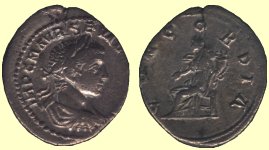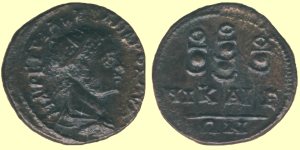
Severus Alexander 222 - 235 A.D.
By clicking on the pictures you'll be linked to a more complete description of the coin. At the bottom of this page there is a more elaborate biography of the emperor.
 |
Obverse: IMP C M AVR SEV ALEXAND AVG |
| Reverse: CONCORDIA | |
|
Fieldmarks: -
|
|
| Exergue: - |
 |
Obverse: M AVP CEVH AΛEΞANΔPOC AVG |
| Reverse: NIKAIE ΩN | |
|
Fieldmarks: -
|
|
| Exergue: - |
Severus Alexander 222 - 235 AD
Marcus Julius Gessius Alexianus was born on the 1st of October 208 AD in Arca Caesarea in Syria. He was the son of Gessius Marcianus and Julia Avita Mamaea, was well educated and only came in the public eye when the activities of his cousin Elagabalus became increasingly unacceptable. In 221 he was adopted by Elagabalus as a colleague, was given the name Marcus Aurelius Severus Alexander, and elevated to the rank of Caesar. There had been talk that he was the illegitimate child of Caracalla, which won him support among the army and his new name linked his ancestry to the popular Septimius Severus. His appointment was part of a plot by Julia Maesa, grandmother to both Elagabalus and Alexander, and his mother Julia Mamaea. They persuaded Elagabalus to promote his cousin as his heir with the intention of substituting him for the increasingly unpopular Elagabalus who soon discovered that Alexander was a great threat to his life due to the immense popularity his young cousin enjoyed. Elagabalus sought to have Alexander assassinated and apparently two attempts were made on his life but both failed due to the protection of his powerful grandmother. These attempts were the final straw and Julia Maesa bribed the praetorian guard and Elagabalus was murdered. Less than a year after his ascension to the rank of Caesar, on the 13th of March 222 AD Severus Alexander was hailed as emperor by the army thus becoming the youngest emperor in Rome's history at the age of 14.
Since Severus Alexander was very young and had absolutely no experience in government he was largely dependent upon others. At first it was his grandmother, Julia Maesa who took control but she passed away quite quickly. His mother, Julia Mamaea, took over and she played a major role in the empire's administration from early on right until the end, she was assisted by a council of 16 distinguished senators. To show her importance she assumed the title of Mater Augusti et castrorum et senatus et patrie (Mother of the Emperor, the army, the senate and the country). Later she even took the title of Mater universi generis humani (Mother of humanity).
Immediately at the beginning of his reign Severus Alexander brought back a sense of sanity and tradition after the madness and fanaticism of Elagabalus. He restored the old gods and the sacred black stone of the sun god El-Gabal so worshipped by Elagabalus was quietly returned to its original temple. The temple where it stood, the Elagaballium, was rededicated to Iovi Ultor (Jupiter the Avenger). To improve his prestige Severus Alexander also started to restore several great public works. The colosseum which was severely damaged by lightning during Elagabalus' reign was fully restored and the huge baths begun by Caracalla were finished. He also built the last of the eleven great aqueducts, the aqua Alexandrina, which was put into service in 226 AD.
Then trouble arose in the East where the Parthian dynasty, which had ruled the Iranian plateau and other large areas for centuries,were overthrown by the Persian family of the Sassanides under the leadership of king Artaxerxes (Ardashir) in 227 AD. They aspired to restore their domain to include all the Asian lands which had been ruled in the glory days of the Persian Empire and because this included Asia Minor and other eastern Roman provinces this meant trouble. At first these Sassanide incursions were very successful and they overran Mesopotamia. After failed attempts at negotiating Severus Alexander and his mother went east to Antioch to deal with this problem in 231 AD. Before the military campaign could start however he had to deal, succesfully, with several mutinies and rebellions. Severus Alexander had little military experience but his generals led a counterattack against the Persians with mixed success, they reclaimed Mesopotamia but couldn't accomplish much else. This led to a status quo whereby both sites more or less respected each others borders. In 233 AD Severus returned to Rome celebrating a huge victory but the military wasn't very impressed.
Soon after another problem required his immediate attention, several Germanic tribes took advantage of the withdrawal of Roman troops for the eastern war and had started to cross the Rhine. In 234 AD, Severus Alexander and Julia Mamaea moved to Moguntiacum, the capital of Upper Germany. The military situation improved immediately with the return of the troops from the east, and a big offensive campaign was planned. A bridge of ships was constructed to carry the Roman army across the Rhine to take the fight to the invaders but Alexander preferred to negotiate for peace by buying off the enemy. Angered and humiliated by this proposal the soldiers mutinied and hailed one of their senior officers, Julius Verus Maximinus, as their new emperor. With Severus Alexander camped close by at Vicus Britannicus, Maximinus gathered his troops and marched against him, Alexander's troops quickly turned on their emperor and in March 235 they killed the emperor and his mother. Severus Alexander was deified by the senate and received several posthumous honors. With his successor Maximinus Thrax there came an end to the Severan dynasty and the reign of the so-called soldier emperors started. In hindsight Severus Alexander did a great job, his political and social reforms where widely celebrated, however severe military turmoil and his lack of experience in dealing with these sort of troubles eventually led to his demise.
For much more information on Severus Alexander see this excellent webpage.
For this biography I've used the texts from the following websites:
http://www.imperiumromanum.com/
http://www.roman-emperors.org/
http://www.roman-empire.net/
And from: Gibbon's Decline and fall of the Roman empire.